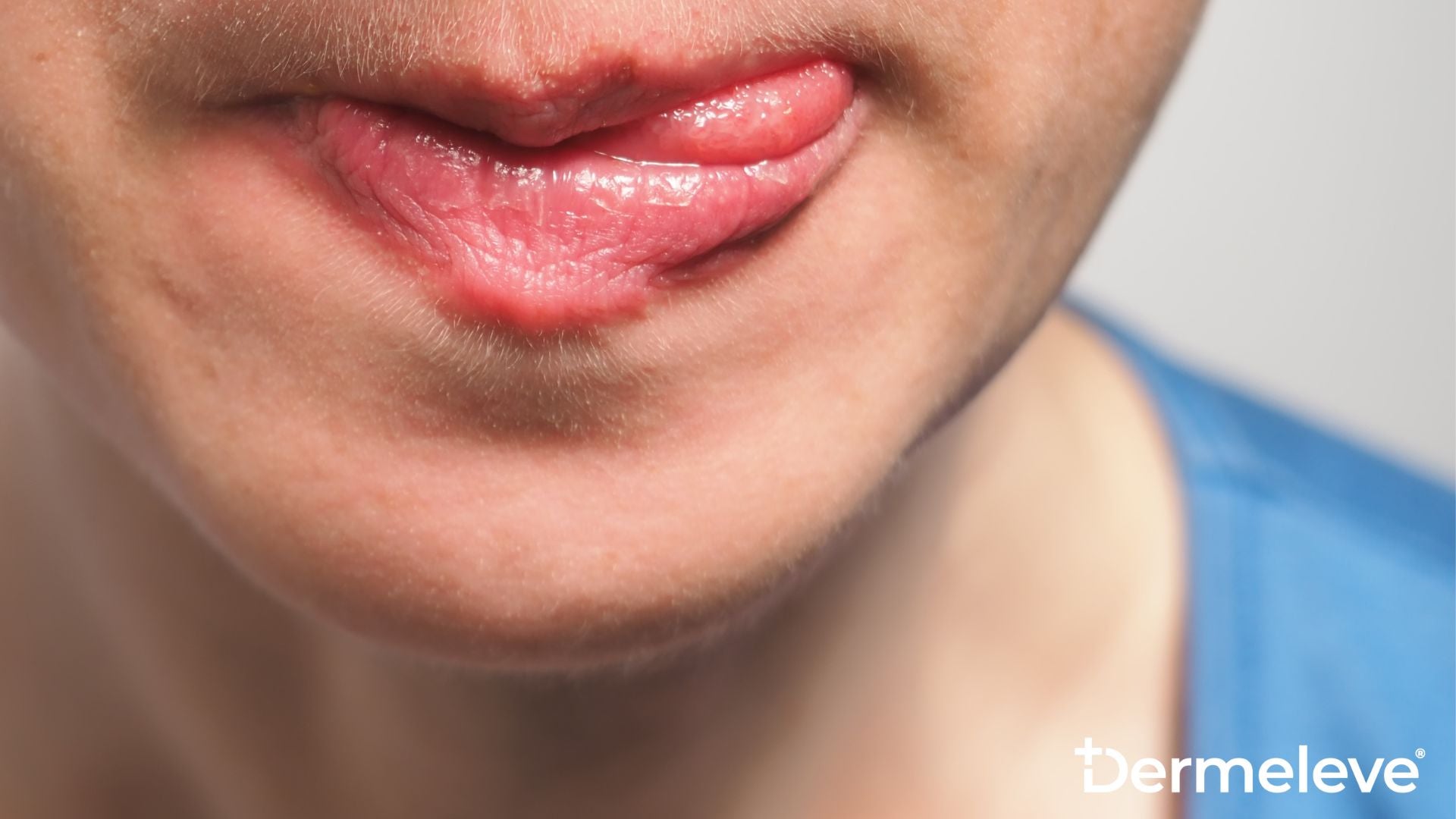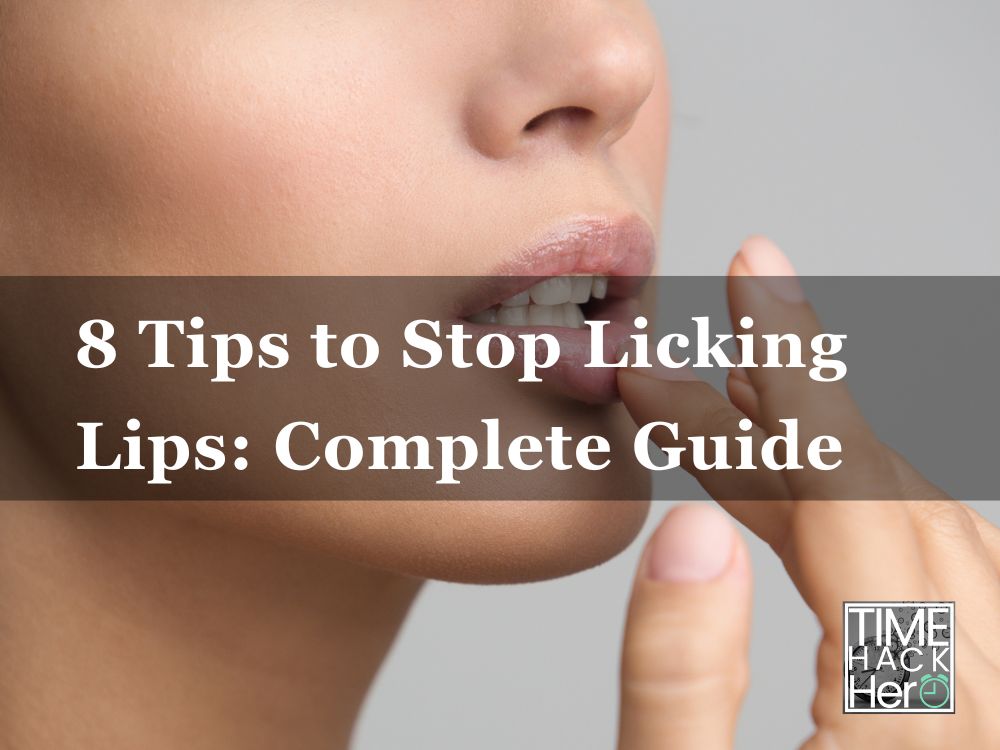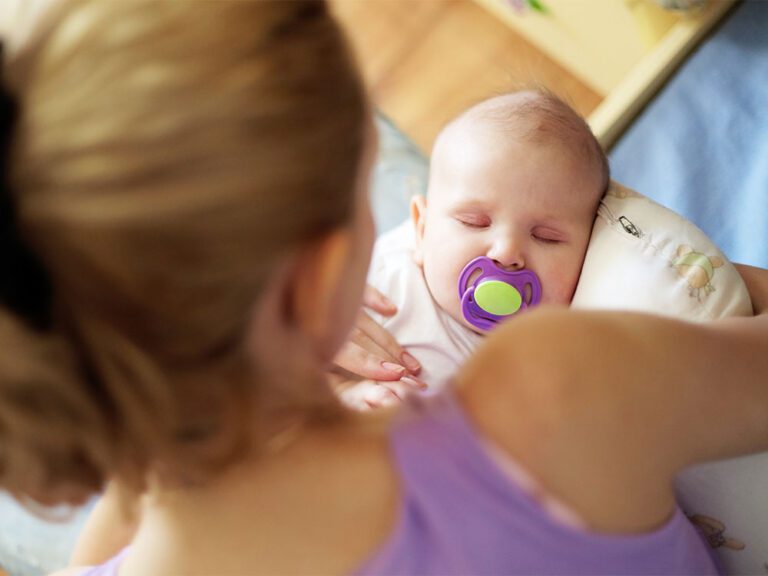How to Get a Child to Stop Licking Their Lips: Effective Strategies
To get a child to stop licking their lips, offer them lip balm or soothing cream as a distraction and to improve the health of their lips. It’s important to provide support and encouragement if they express frustration or unhappiness about the habit.
Additionally, divert their attention during stressful situations and offer water regularly to hydrate their lips. Avoid punishing the behavior and instead focus on providing alternative solutions such as sugar-free candies or gum. Chronic lip licking can be caused by factors like harsh weather conditions, anxiety, or chronic dryness.
Taking steps to prevent these triggers and promoting a nourishing lip care routine can help break the habit.
Teach Healthy Lip Care Habits
Help your child break the habit of lip licking by offering distractions like lip balm or soothing cream. Avoid punishing the behavior and instead offer support and encouragement. Consider using sugar-free candies or diverting their attention during stressful situations.
Introduce The Importance Of Lip Care
Teaching your child healthy lip care habits is essential to prevent lip licking and maintain optimal lip health. Licking the lips excessively can lead to dryness, chapping, and even painful cracks, known as lip licker’s dermatitis. By introducing the importance of lip care, you can help your child understand the negative effects of lip licking and cultivate healthier habits.
Demonstrate Proper Lip Moisturization Techniques
To prevent your child from constantly licking their lips, it is crucial to teach them proper lip moisturization techniques. Provide them with a nourishing lip balm, such as ChapStick or Blistex Five Star Lip Protection, and demonstrate the correct way to apply it. Encourage your child to gently rub the lip balm over their lips, ensuring full coverage. This will help keep their lips hydrated and prevent the urge to lick them.
Encourage Regular Application Of Lip Balm
Regular application of lip balm is key to maintaining healthy lips and breaking the habit of lip licking. Motivate your child to apply lip balm throughout the day, especially when they feel the urge to lick their lips. Make it a part of their routine, such as before leaving the house, after meals, and before bedtime. Provide them with their own lip balm stick, like Herpecin L Lip Balm Stick or Blistex Lip Balm Medicated, so they can easily access it whenever needed.
Pro Tip: Consider keeping a small container of lip balm in your child’s backpack or pocket, so they always have it within reach.
Identify And Address Underlying Causes
To get a child to stop licking their lips, it is important to identify and address the underlying causes. Lip licking can be a sign of anxiety or nervousness, so offering distractions like lip balm or soothing cream can help.
Additionally, providing support and encouragement to break the habit can make a difference.
Determine If There Are Any Medical Conditions Contributing To The Lip Licking Habit
It is important to first determine if there are any underlying medical conditions causing your child’s lip licking habit. Lip licker’s dermatitis, for example, is a common condition in children or individuals with cognitive impairments. They may have difficulties regulating impulsive behaviors, such as lip licking. Additionally, factors like harsh weather conditions, sunburn, anxiety, chronic dryness, and chronic nasal congestion can also contribute to excessive lip licking. Identifying these medical conditions is crucial in addressing the root cause of your child’s habit.
Assess If Anxiety Or Nervousness Is A Trigger
Anxiety or nervousness can often trigger lip licking habits in children. If you notice that your child licks their lips in situations that make them anxious or nervous, it is essential to recognize this as a potential trigger. By understanding the connection between anxiety and lip licking, you can then focus on addressing the underlying anxiety or nervousness. Creating a soothing and supportive environment for your child and offering them emotional support can help alleviate their anxiety and reduce the need to constantly lick their lips for comfort.
Seek Professional Help If Necessary
If your child’s lip licking habit persists despite your efforts to address the underlying causes, it may be beneficial to seek professional help. Consulting a pediatrician or a dermatologist can provide further insight into any potential medical concerns or dermatological conditions that may be contributing to the habit. These professionals can offer tailored advice and treatment options to help your child break the habit effectively. Remember, seeking professional help is a proactive step in ensuring your child’s overall well-being.
Provide Distractions And Alternatives
To get a child to stop licking their lips, offer distractions and alternatives. Provide lip balm or soothing cream for them to apply, which helps distract them and improves lip health. Show support and offer encouragement if they express frustration or unhappiness about the habit.
Offer A Sensory Substitute For Licking, Such As A Fidget Toy Or Chewy Necklace
One effective way to redirect a child’s lip licking habit is by providing them with a sensory substitute. This can come in the form of a fidget toy or chewy necklace. These objects offer a tactile sensation, which can help distract the child from the urge to lick their lips.
Engage The Child In Activities That Keep Their Hands Busy
Another strategy to discourage lip licking is by engaging the child in activities that keep their hands busy. This will not only redirect their attention away from their lips but also provide a productive outlet for their energy. Encourage them to participate in crafts, puzzles, or any other hands-on activities that capture their interest.
Encourage Drinking Water Or Chewing Sugar-free Gum To Alleviate The Urge To Lick Lips
Drinking water or chewing sugar-free gum can be helpful in alleviating the urge to lick lips. Staying hydrated reduces dryness, which is often a trigger for lip licking. Additionally, the act of chewing gum provides a sensory distraction and stimulates saliva production, keeping the lips moisturized.
Create A Positive And Supportive Environment
Help your child break the habit of lip licking by creating a positive and supportive environment. Offer distractions like lip balm or soothing cream, provide words of encouragement, and avoid punishing the behavior.
Avoid Shaming Or Scolding The Child For Their Lip Licking Habit
When trying to help a child stop licking their lips, it’s important to create a positive and supportive environment. One crucial aspect of this is avoiding shaming or scolding the child for their lip licking habit. Instead of criticizing or reprimanding them, approach the situation with empathy and understanding.
Provide Encouragement And Praise For Their Efforts To Stop
Children respond well to positive reinforcement, so it’s essential to provide encouragement and praise for their efforts to stop licking their lips. Acknowledge their progress and highlight their achievements, no matter how small. This will motivate them to continue their journey towards breaking the habit.
Offer Rewards Or Incentives To Motivate Them
Another effective way to create a positive and supportive environment is by offering rewards or incentives to motivate the child. This can be as simple as a sticker chart, where they receive a sticker for each day they refrain from lip licking. Once they reach a certain number of stickers, they can earn a small treat or privilege.
Summary
In conclusion, creating a positive and supportive environment is crucial when helping a child stop licking their lips. Avoid shaming or scolding them, provide encouragement and praise for their efforts, and offer rewards or incentives to keep them motivated. By adopting these approaches, you can create a nurturing atmosphere that will aid in breaking the habit and supporting your child’s progress.
Establish Consistent Lip Care Routine
To help your child stop licking their lips, establish a consistent lip care routine. Offer lip balm or soothing cream as a distraction and improvement to lip health. Support your child by offering encouragement and alternative activities during times of frustration or stress.
Set Reminders For The Child To Apply Lip Balm Regularly
Setting reminders for your child to apply lip balm regularly is an effective way to establish a consistent lip care routine. Children often need guidance and support in developing good habits, and using reminders can be a helpful tool. You can use various methods to remind your child, such as setting an alarm on their phone, placing sticky notes in visible places, or verbally reminding them at specific times throughout the day.
Make Lip Care A Part Of Their Daily Hygiene Routine
Incorporating lip care into your child’s daily hygiene routine is crucial to help them break the habit of licking their lips. By making it a regular part of their routine, you are reinforcing the importance of taking care of their lips and promoting healthier habits. Encourage your child to apply lip balm after brushing their teeth in the morning and before going to bed at night. This consistent practice will help keep their lips moisturized and reduce the tendency to lick them.
Create A Visual Schedule To Reinforce The Habit Of Healthy Lip Care
A visual schedule can be an effective tool to reinforce the habit of healthy lip care in children. Visual schedules provide a clear and visual representation of the daily tasks and activities that need to be completed. You can create a simple chart or use an app that allows you to customize and display the schedule in a visually appealing way. Include a specific section for applying lip balm, and make it a consistent part of your child’s daily routine. The visual reminder will serve as a prompt for your child to take care of their lips and break the habit of licking them.

Credit: dermeleve.com
Frequently Asked Questions On How To Get A Child To Stop Licking Their Lips
Why Does My Child Keep Licking His Lips?
The habit of lip licking in children can be due to lip licker’s dermatitis, cognitive impairments, anxiety, or nervousness. To break the habit, provide distractions like lip balm, soothing cream, or sugar-free candies. Encourage and support your child without punishment.
Consider using nourishing lip balm or lip oil, revamp lip care routine, wear lip gloss or lipstick, chew gum, and keep a humidifier handy. Additionally, factors like harsh weather conditions, sunburn, dryness, and chronic nasal congestion can contribute to excessive lip licking.
How Do You Break A Lip-licking Habit For Kids?
To break a lip-licking habit for kids, offer lip balm or soothing cream for distraction and lip health. Provide support and encouragement if they express frustration. Divert their attention during stressful situations and offer water regularly. Avoid punishing the behavior and consider using sugar-free candies as an alternative.
How Do I Stop Compulsive Lip-licking?
To stop compulsive lip-licking, try these tips: 1. Use a nourishing lip balm or lip oil. 2. Establish a proper lip care routine. 3. Wear lip gloss or lipstick. 4. Chew sugar-free gum. 5. Keep a humidifier nearby. Lip-licking can be caused by weather conditions, anxiety, or chronic dryness.
Break the habit by taking care of your lips and finding distractions.
What Causes Excessive Lip-licking?
Excessive lip licking can be caused by harsh weather conditions, sunburn, anxiety, chronic dryness, and chronic nasal congestion. To break the habit, offer distractions like lip balm or soothing cream, provide support and encouragement, and consider using lip gloss or chewing gum.
Keeping lips nourished and hydrated can also help prevent excessive licking.
Conclusion
Helping a child to stop licking their lips can be a challenge, but with patience and consistency, it can be achieved. By providing distractions such as lip balm or soothing cream, offering support and encouragement, and redirecting their attention during stressful situations, parents can help break this habit.
It’s important to address the underlying causes, such as anxiety or dryness, and provide appropriate solutions to ensure the child’s oral health and well-being. Remember, breaking a habit takes time, so be patient and persistent in your approach.







